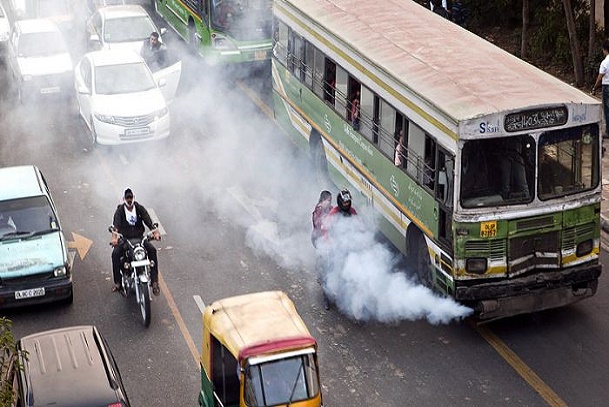 Wash your hands regularly and wear a face mask.
Learn more
Wash your hands regularly and wear a face mask.
Learn more

Every day on the street of major cities across Nigeria, thousands of automobiles roam the streets releasing an unprecedented amount of poisonous gas into the atmosphere. Certainly, with Nigeria’s population hitting an all-time high of an excess of 190 million according to worldpopulationreview.com, this problem and its resultant effects are fast becoming a major concern. People no longer have access to clean fuels and technology (lamps and stoves). Even the very air we breathe is becoming toxic with more people dying from lung cancer every year.
While Nigeria sits at the fore front of this growing menace, the rest of the world is also not left out. In fact, the World Health Organization (WHO) in a review which followed the just concluded Global Conference on Air Pollution and Health held in Geneva on the 29th October to the 1st of November 2018 stated that nine out of ten people breathe in polluted air, which goes on to kill 7 million people yearly. According to the review, one-third of the deaths recorded from stroke, lung cancer, and heart disease can be traced to air pollution. This statistic represents an equivalent effect to that of smoking tobacco and a lot higher than the effects of excessive salt consumption.
Air pollution is a major global health problem; in Nigeria, it is even fiercer. It does not matter how serene you consider your environment or neighbourhood to be, polluted air is extremely difficult to escape. Microbes and several other forms of contaminants are capable of penetrating deep into our respiratory and circulatory systems, doing damages to our lungs and brain in the process.
A Reality Check…
Unlike other causes of diseases, air pollution isn’t quite as straight-forward. It is a general perception that bad air will be preceeded by the presence of visible smog and toxic smells or un-familiar weather manifestations. While this isn’t totally false, the fact that the sky is clear doesn’t necessarily mean that the available air is healthy. Across the world, including Nigeria, inhabitants of villages and cities are experiencing pollution levels that exceed the average annual values recommended by WHO. This is why the World health body in conjunction with the UN Environment and Climate and Clean Air Coalition developed an online pollution meter as part of its Breathe Life Campaign to help people determine how polluted the air the breathe is.
The absence of physical indicators gives a false sense of hope that things are not as bad as they may have been published on major health platforms all year round. But in truth, pollution does exist whether the sky is black or not. The growing cases of pollution-related deaths is a strong indication that people breathe in bad air regardless of where they find themselves. A news release by the WHO on 29 October 2018 confirms that more than 90 percent of children the world over breathe toxic air. A clear indication that the other fragment of the population is isn’t exactly safe.
What You Should Know
Air pollution may sometimes seem like a broad health topic but in reality, it can be divided into two main types only; household pollution and ambient or outdoor pollution.
Household pollution refers to the pollution generated through household combustion of fuels such as kerosene, coal or wood. This represents a major source of air pollution in Nigeria since more than half of the population live below the poverty line and tend to get heat from burning cheaply sourced fuel such as kerosene, wood or coal.
Ambient pollution, on the other hand, refers to pollution generated outdoors. Both household and ambient sources of pollution can contribute to each other since air is constantly flowing in and out of buildings. Furthermore, household air pollution remains the major causes of pollution-related deaths. According to an article released by the WHO titled “how air pollution is destroying our health”, household air pollution is responsible for the death of 4 million people every year… Asia and Africa are the most affected. Children and women who spend most of their time in the comfort of their homes tend to be greatly affected by the emissions coming from burning fuels in such confined spaces.
What To Do…
While the Nigerian government is doing a lot to make the environment a lot safer and healthier through the actions of the Federal Environmental Protection Agency (FEPA) and collaborations with several institutions outside the shores of the country, controlling and mitigating air pollution goes beyond just creating new fancy laws. Households and individuals need to take up the responsibility of managing the toxic air being generated in their homes through fuel combustion.
Safer alternatives to fuels like kerosene, coal, and wood should be employed. This includes putting automobiles and utility engines such as generator sets in good working condition to prevent them from releasing sooth and CO2 riddled smoke. Certainly, homes both in the rural and urban centers will be a lot safer to live in if ‘green’ alternative fuel and power sources are used more frequently.
The global wake up call to the rising menace of air pollution was the major topic of discussion at the just concluded Global Conference on Air Pollution and Health in Geneva. Nigeria as the most populous black nation on earth will do well to take a cue from the recommendations made at the annual event.
WHO
World Population Review